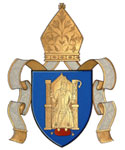 |
 |
News
Clogher Diocesan Synod 2013
Clogher Diocesan Synod was held in St Macartin's Cathedral Hall, Enniskillen on Thursday 26th September, commencing with a service of Holy Communion in Enniskillen Cathedral. During the service the Old Testament Reading was read by the Revd John McClenaghan, the Psalm was read by the Revd Alistair Warke, the Epistle was read by Mrs Eileen Gallagher, a representative of the Roman Catholic Church, the Gospel was read by the Revd Rob Clements, and the intercessions were led by the Revd Eleanor Hayden, a representative of the Methodist Church. The celebrant was the Bishop, the Rt Revd John McDowell, who was assisted in the administration of Communion by the Dean, the Very Revd Kenneth Hall and the Revd David Cupples, a representative of the Presbyterian Church. The hymns were Be thou my vision O Lord of my heart, Lord, enthroned in heavenly splendour, and God has spoken by his prophets.
The Rt Revd John McDowell, Bishop of Clogher, presided at Synod, and the Assessor was Sir Anthony Hart. Synod commenced with a Scripture Reading read by Mrs Ethne McCord and prayers led by the Ven. Cecil Pringle, Archdeacon.
Observers from Sister Churches included the Revd Eleanor Hayden and Miss Marian Henderson of the Methodist Church, the Rt Revd Monsignor Peter O'Reilly, PP, VG, and Mrs Eileen Gallagher of the Roman Catholic Church, and the Revd David Cupples of the Presbyterian Church.
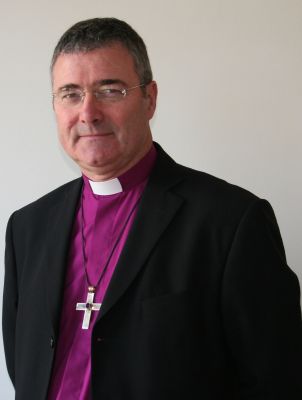
Rt Revd John McDowell Bishop of Clogher
During his presidential address the Bishop stated that "our belief will have been shaped by different traditions both within and beyond the Church of Ireland, and if we were each asked to give an account of our belief we might be surprised at how much we differ from one another. But the one thing we have absolutely in common is that we have all been baptised into the death and resurrection of Jesus Christ and as our faith has deepened we have grown into our baptism. That common baptism works itself out in many ways." The bishop went on to say "by baptism and faith each of us participates in the life of Jesus; in his life as prophet, a priest and a king."
Focusing on that word "prophet" and what it means for baptised believers, the Bishop said "we are always hearing voices saying that the those in the Church should be more prophetic. That we should take a prophetic stand on this, that or the other. Usually what people really want us to do when they ask us to speak prophetically is to agree with them in a very loud voice. However, prophecy is not just a matter of sounding off'. Prophecy, in scripture, is the task of patiently and steadfastly recalling the whole community to its proper vocation. The prophet in the Old Testament is somebody who seeks to bring God's people back to their first loyalty, to their central, true vocation. To say to the whole community, of which the prophet is also a part, "This is what we really are. This is what we're really about." In that sense prophecy is about calling people back to basics. Baptised people are called to remind one another - nagging one another sometimes - to get back to those rudiments of religion. That, I think, is the sort of mutual encouragement and admonition which marked the Primitive Church off from other religious societies and, believe it or not, it is also part of the purpose of gatherings of bishop, clergy and lay people in Councils and Synods."
Commenting on the business of synod, the Bishop said "what we are to discuss today and what we have done in past years should be about how we organise and resource ourselves for this work of ministry as prophets, priest and kings. Because we live in a complex society and because a largish organisation like a diocese is also complex, that will involve a great deal of what might be regarded as boring detail. And it will indeed be boring detail unless we remember what its final purpose is - to equip us for the ministry to which each of us was called in baptism."
Commenting on the year past the Bishop said "it was a privilege and an enormous responsibility to be asked to preach at the special service in Enniskillen Cathedral to remember the awful events of Remembrance Sunday 1988. There can be no more fundamental part of our vocation than to comfort those who are suffering and to bind up the broken hearted. And that is not the work of a day or a fortnight, but requires faithfulness and patience. It is indeed part of our vocation never to forget the innocent victims of cruelty or to allow their voice to go unheard as though they did not matter. I hope we have done that especially in the patient and unseen work of pastoral ministry in our parishes."
Speaking about Remembrance Sunday the Bishop spoke about "another opportunity to exercise a prophetic vocation - this time as peacemakers and reconcilers - when the Taoiseach, Enda Kenny visited Enniskillen, first to lay a wreath at the Cenotaph and then to attend a service in the Cathedral and to meet some of the victims of the Enniskillen Bombing afterwards. For, if we have a steady and lasting obligation never to forget those who have suffered and who continue to suffer, we have also an urgent vocation to consider what sort of society we are going to build for the future and to take steps that will create an atmosphere in which true peace can flourish."
In relation to Education the Bishop referred to the words of a statement made by the Archbishops and Bishops of the Church of Ireland in 2009, "Education is nothing less than the formation of individuals in which they realise their full potential in community and their unique service to society". He said "that is a very wide ranging task and I want to encourage every one here who has any part to play in education on behalf of the Diocese. When the Churches transferred their schools to the State, we secured the right to be involved in the governance of those schools. That is a right which we should cherish and act upon. We have our distinctive contribution to make and we should ensure that we exercise our right and our duty in every parish and in every school where it is available to us."
Later in his address, the Bishop mentioned the Irish Churches Peace Project, a number of events which have taken place in the diocese during the past year, and expressed his honour of representing the Church of Ireland at the service, in Westminster Abbey, to mark the sixtieth anniversary of the Coronation of the Queen.
The Revd Canon Maurice Armstrong and the Revd Canon Bryan Kerr were re-elected as Clerical Honorary Secretaries, and Mr John Irvine and Cllr Rosemary Barton were re-elected as Lay Honorary Secretaries.
The Rt Revd Monsignor Peter O'Reilly, PP, VG, brought greetings on behalf of the Roman Catholic Church, Miss Marian Henderson on behalf of the Methodist Church, and the Revd David Cupples on behalf of the Presbyterian Church.
Mr William Allen was re-elected to serve as a lay member of the Representative Church Body.
The minutes of the previous Synod were placed on the table, together with communication from the General Synod.
Standing Orders were suspended to allow for a presentation from the Diocesan Wells Project which was given by the diocesan youth officer, Mr Jonny Phenix.
The 142nd Report of the Diocesan Council was proposed by the Revd Gary McMurray and seconded by Mr Walter Pringle. The Report was considered seriatim and adopted.
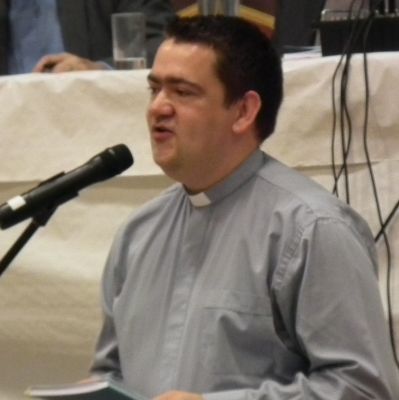
Revd Gary McMurray Aghavea Parish
Standing Orders were again suspended to allow for the presentation of Medals by the Clogher Diocesan Board of Religious Education which were made by the Bishop whilst Synod was in recess for tea. For the Archbishop Ruddell Prize, first place was awarded to Donagh Sunday School, and second place went to William Lavelle of Newtownsaville Parish. For the Bishop's Medal all three awards went to parishioners of Newtownsaville Parish, in first place was Hollea Lavelle, in second place was Jack Steenson, and third place went to Rebecca Lavelle.
The first motion of the evening concerned the amendment of the Diocesan Election Procedures in order to bring them into line with recent revisions made to the Church of Ireland Constitution concerning the re-election of member of General Synod. The motion was proposed by the Revd Canon Bryan Kerr and seconded by the Very Revd Kenneth Hall.
The second motion to be tabled again concerned Diocesan Election Procedures and also the Order of Business at Synod. Proposed by the Revd Canon Bryan Kerr and seconded by the Revd Canon Maurice Armstrong, the motion brings the election of honorary secretaries into line with all other diocesan elections, so that they are elected by a nomination and postal ballot process, and on a triennial basis rather than an annual basis.
A motion to merge the two diocesan youth councils into a single Clogher Diocesan Youth Council included the Constitution of the proposed new single youth council was proposed by the Revd Henry Blair and seconded by the Revd Canon Ian Berry.
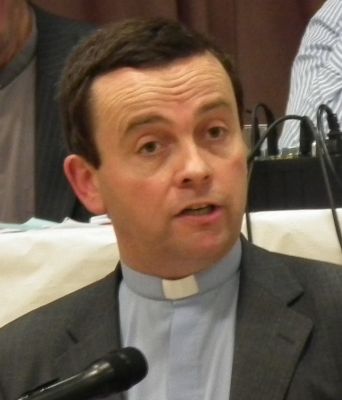
Revd Henry Blair Magheraculmoney Parish
A motion to amend the Diocesan Financial Scheme was proposed by the Revd Mark Watson and seconded by Capt. Robert Lowry to take cognisance of recent changes in the Church of Ireland Clergy Pension Fund which were approved by General Synod.
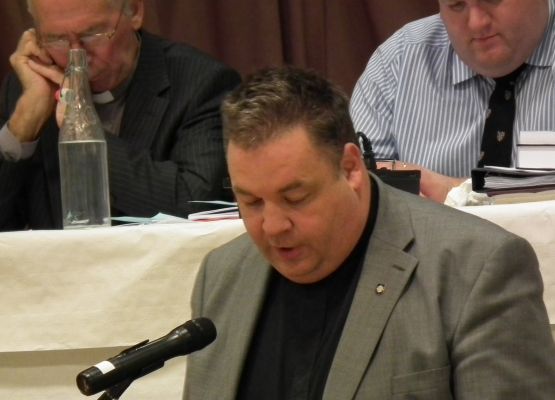
Revd Mark Watson Trory and Killadeas Parish
Two motions concerning the diocesan financial scheme were presented. The first was proposed by the Revd Henry Blair and seconded by Mrs Joy Graham. The second was proposed by Mr Henry Robinson and seconded by the Ven. Cecil Pringle.
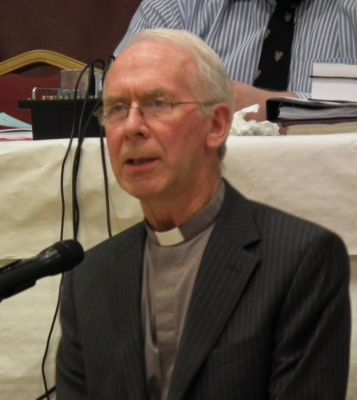
Ven. Cecil Pringle Archdeacon of Clogher
Standing Orders were once again suspended to allow for a presentation by Mr Keith Hamilton, Director of the Irish Churches Peace Project.
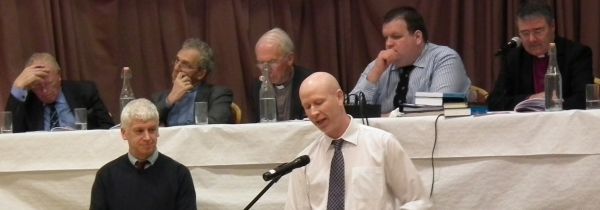
Keith Hamilton and Glenn Harvey Irish Church Peace Project (ICPP)
The Youth Committee (NI) report was presented by the Revd Henry Blair
and the Revd Canon David Skuce, and the Youth Committee (RoI) was noted.
The report of the Clogher Diocesan Board of Religious Education was proposed by Mr Jim Kerr and seconded by Mr Robert Watterson, and the report of the Clogher Diocesan Board of Mission was proposed by Mr Walter Pringle and seconded by the Revd Betty Thompson.
The report of the Clogher Diocesan Board of Social Theology in Action was proposed by the Revd Charlie Eames and seconded by Mr Neville Armstrong. The Ministry of Healing report was noted and the report of the Diocesan Glebes Committee was proposed by the Ven. Cecil Pringle and seconded by Mr Henry Robinson.
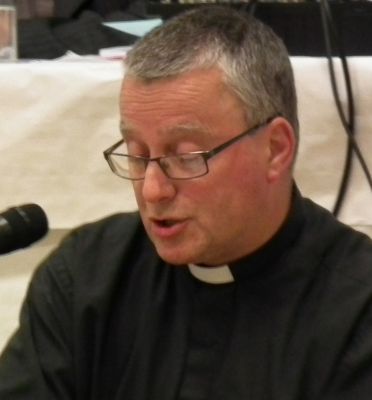
Revd Brian Harper Magheracross Parish